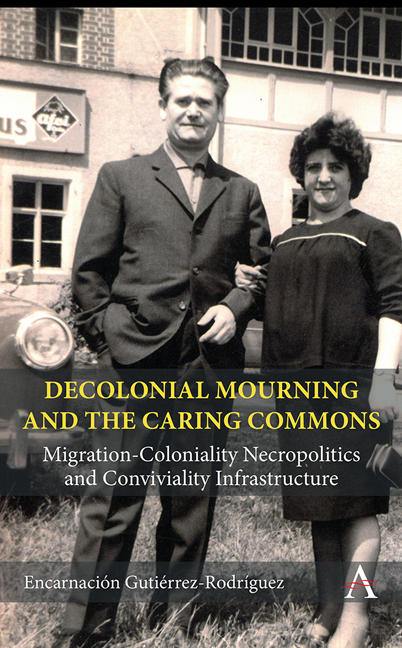 Decolonial Mourning and the Caring Commons
Decolonial Mourning and the Caring Commons Book contents
- Frontmatter
- Contents
- Acknowledgments
- 1 Introduction: Entangled Mournings
- 2 Trauerarbeit: Decolonial Mourning
- 3 Political Mourning
- 4 Countering Necropolitical Social Reprodution
- 5 Accountable Mourning: Bearing Witness
- 6 Communal Mourning: Becoming-With
- 7 Mourning’s Justice: Conviviality Infrastructure of a Caring Commons
- Notes on Author
- References
- Index
5 - Accountable Mourning: Bearing Witness
Published online by Cambridge University Press: 29 February 2024
- Frontmatter
- Contents
- Acknowledgments
- 1 Introduction: Entangled Mournings
- 2 Trauerarbeit: Decolonial Mourning
- 3 Political Mourning
- 4 Countering Necropolitical Social Reprodution
- 5 Accountable Mourning: Bearing Witness
- 6 Communal Mourning: Becoming-With
- 7 Mourning’s Justice: Conviviality Infrastructure of a Caring Commons
- Notes on Author
- References
- Index
Summary
Introduction: (Con)Dolence and Accountability
We walked everyday with literally amputated hearts, every single day. And it hurts—every single day and for people to even expect that you get over it or that your grieving pattern or grieving stage, wherever you are in a grief that somehow there is a blueprint to navigate it—that we should be at a certain point. It comes to you unaware, it comes to you at the most unpredictable moments, because we don't give a chance to our sisters to rest, there is going to be someone else killed. And it starts it over again, the festering wounds, the acid is poured again. It starts it over and over again and yet our daughters are still erased.
(Gina Best, mother of India Kager, AAPF, Pt. 11)Gina Best describes the unintelligible pain of losing her 27-year-old daughter India Kager in the webinar “Under the Blacklight: Say Her Name—Telling Stories of State Violence & Public Silence” (Pt. 11) on 17 June 2020, organized by the #SayHerName campaign, Kimberlé Crenshaw, the African American Policy Forum (AAPF), and the Center for Intersectionality and Social Policy at the Columbia Law School. I listen at home while Best recalls that India and her partner Angelo Perry visited his family 5 September 2015 to introduce Roman, their four-month-old baby, to them. After the visit, they were sitting in a Walmart parking lot when police officers fired 50 bullets into their car. Angelo and India were killed immediately; Roman was left disabled and now lives with his grandmother, Gina.
The police failed to immediately inform Kager's family about her killing, leaving her body on the ground of the parking lot overnight. In a statement, the police admitted that India and Angelo were killed because they mistook the latter for a wanted offender (Pt. 11). In the webinar, Best raises questions about the police's responsibility for the murder of her daughter, the failure to care for her dead body and the negligence displayed in dealing with the families’ grief and need for information, clarification and a thorough investigation. India “was in her own car with her own baby, going about her life” (ibid.); thus the question of why her life was violently ended by police brutality remains unanswered.
- Type
- Chapter
- Information
- Decolonial Mourning and the Caring CommonsMigration-Coloniality Necropolitics and Conviviality Infrastructure, pp. 111 - 136Publisher: Anthem PressPrint publication year: 2023
